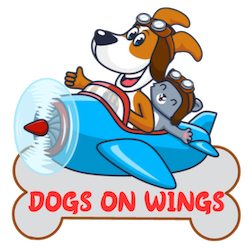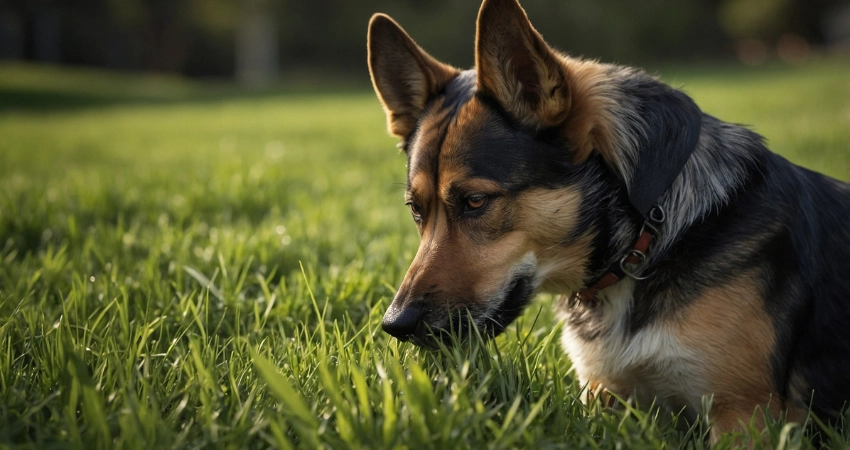Why dogs eat grass? This is a common question among pet owners who notice their furry companions nibbling on leaves during walks or in the backyard. But is this a health issue or just a natural behavior?
Understanding the reason goes beyond merely observing the habit; it involves examining aspects of behavior, health, and even diet. Various factors, from nutrient-seeking to emotional issues, can drive dogs to this curious behavior.
If you’ve also wondered what’s behind this habit, keep reading. We’ll uncover the reasons that explain this behavior, debunk popular myths, and share tips on how to handle the situation, ensuring your four-legged friend’s well-being.
Why dogs eat grass? The main reasons
There are numerous explanations for this common canine behavior. Below, you’ll find the most relevant ones and their explanations. Check them out:
1. A Natural Instinct
So, why dogs eat grass? Many experts believe this practice is tied to dogs’ ancestral instincts. Before domestication, wild dogs often consumed plants as part of their diet.
This happened because their prey frequently ate vegetation, transferring these nutrients to the predators. Thus, the habit might be a remnant of evolution.
Another hypothesis is that dogs eat grass to “cleanse” their digestive systems. Although not all dogs vomit after eating grass, some pet owners notice this behavior when their dog feels unwell. The texture of grass may stimulate the gastrointestinal tract, helping relieve discomfort.
Additionally, in extreme hunger situations, wild dogs used plants to supplement their diet. While domestic dogs have access to kibble and other foods, the behavior may persist as a genetic trait, even when there’s no nutritional need.
2. Nutritional Deficiency: Could This Be the Reason?
One frequently discussed explanation for the question, “why dogs eat grass?” is a lack of nutrients in their diet. Dogs without a balanced diet might seek out grass for missing substances, such as fiber or minerals.
For instance, fiber is crucial for intestinal health, aiding digestion and maintaining regular bowel movements. Although high-quality commercial kibble typically meets these needs, some diets may be deficient, prompting dogs to look for alternatives in nature.
However, studies suggest that even well-fed dogs may eat grass. This indicates the habit isn’t solely linked to nutrition but could also stem from other factors, like curiosity or boredom.
3. Emotional and Behavioral Issues
Besides physical factors, emotional issues can also explain this behavior. Bored, anxious dogs or those left alone for long periods might develop repetitive habits, like eating grass. This could be a way to alleviate stress or gain their owner’s attention.
A dog’s routine plays a significant role in this context. Animals without enough stimulation, such as walks, playtime, or family interaction, might turn to unusual behaviors as a form of entertainment. Therefore, providing a rich and stimulating routine is essential.
If your dog eats grass frequently and shows other signs of stress, such as compulsively licking their paws or destroying objects, it’s worth investigating further. A veterinarian or behavioral trainer can help identify the root cause.
Is Grass Harmful to Dogs?
Another common question for those wondering, “why dogs eat grass?” is whether it’s harmful. Generally, eating grass isn’t a health risk as long as it’s free from chemicals like pesticides and herbicides.
These products can indeed be toxic to dogs, causing everything from gastrointestinal irritation to severe issues like poisoning. It’s also important to ensure the grass doesn’t contain thorns or mixed toxic plants.
Some species, such as Dieffenbachia and lilies, are highly dangerous for dogs and can cause poisoning.
If your dog has the habit of eating grass, ensure their environment is safe. This includes avoiding public areas treated with chemicals and providing safe chewing alternatives.
Curiosity or Just a Pastime?
There isn’t always a profound reason behind the question, “why dogs eat grass?” Often, it’s simply part of a dog’s natural curiosity. They explore the world primarily through smell and taste, and grass might just be another item on their “try-it” list.
Puppies, for example, tend to chew on everything they come across, including grass. This is part of their learning and discovery process. Over time, many dogs abandon the habit, while others continue simply because they enjoy it.
It’s essential to observe the context of the behavior. Does your dog only eat grass during walks, or does it happen frequently at home? Do they seem bored or excited during the activity? These questions can help you better understand their motivation.
How to Manage the Habit?
If your dog’s grass-eating habit concerns you, here are some steps that might help:
- Provide a balanced diet: Ensure your dog’s food meets all nutritional needs. Consult a veterinarian to adjust their diet if necessary;
- Offer physical and mental stimulation: Walks, playtime, and interactive toys can reduce boredom and stress, lowering the chances of unwanted behaviors;
- Avoid treated grass: Supervise walks and ensure your dog avoids potentially dangerous areas.
- Provide safe alternatives: If your dog likes chewing, offer options like chew toys or natural treats to satisfy this need;
- Seek professional help: If the behavior persists with other concerning signs, consult a veterinarian or trainer.
When Should You Worry?
Although eating grass is usually normal, there are situations where you should be alert. Seek veterinary assistance if your dog shows the following:
- Frequent vomiting: If they vomit every time they eat grass or have recurring vomiting episodes, gastrointestinal issues may need investigation;
- Changes in appetite or weight: Grass-eating combined with weight loss, lethargy, or lack of appetite could indicate an underlying condition;
- Lack of energy: Dogs are typically active. Grass-eating alongside lethargy might suggest a more serious issue;
- Excessive grass-eating: When it becomes compulsive, this may signal emotional or physical imbalance requiring treatment.
Prevention and Quality of Life
While grass-eating doesn’t always require intervention, preventing risky situations is crucial. Some practices to ensure your dog’s safety include:
- Education and training: Teach commands like “no” or “leave it” to control grass access, especially in unknown or chemically treated areas.
- Environmental adaptation: Maintain a clean yard free of toxic plants to create a safe space for exploration.
- Regular vet check-ups: Routine visits help detect nutritional deficiencies or health issues early.
Common Myths About Dogs Eating Grass
When discussing why dogs eat grass, many myths create confusion. Let’s debunk some popular beliefs:
- “Dogs only eat grass when they’re sick”: While some dogs eat grass to ease stomach discomfort, many do so when healthy. Curiosity or boredom often drives the behavior;
- “Eating grass signals worms”: No scientific evidence links grass-eating to parasites. However, regular deworming is essential for overall health;
- “They eat grass because they’re hungry”: Hunger might play a role in some cases, but well-fed dogs exhibit the behavior too. Grass isn’t typically consumed as a primary food source;
- “Eating grass is dangerous”: Grass is generally harmless if it’s free of chemicals and toxic plants. Risks are more about external factors than grass itself.
Why dogs eat grass? Final considerations
Now that you understand why dogs eat grass, you can observe your pet’s behavior more calmly and know when to act. Remember, every dog is unique, and the context of the habit is as important as the behavior itself.
Take the time to understand your dog’s needs—whether physical, emotional, or behavioral. A caring and attentive owner makes all the difference in your furry friend’s health and happiness! If you have questions or want to share your experience, leave a comment—we’re here to help!

